Learning to
Number Our Days
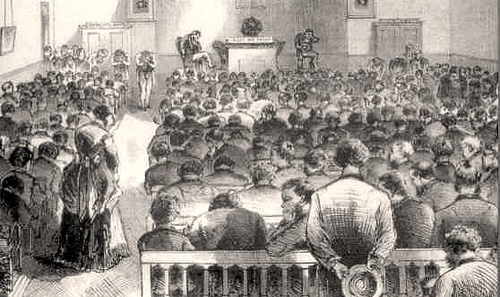
Only One Week Left
I don’t know about you, but I will be glad when the events of November 2 are in the rearview mirror. Whatever way this goes, we will have chaos unless God intervenes. Since I am not a prophet, I won’t predict what will happen in the next few days. But I know one thing. God knows. The Scripture says that He works everything (EVERYTHING, E V E R Y T H I N G) after the counsel of his own will (Eph. 1:11). Because this is true, I am not going to recommend that we all sing the Bobby McFerrin’s 1988 hit “Don’t worry, Be happy,” but there are a host of fine hymns we could sing . . . “Great is Thy Faithfulness” or maybe “Immortal, Invisible, God Only Wise.”
I generally resist commenting on politics for a variety of reasons. My first ministry was in Canada where I was a guest in the country for about a dozen years until my wife and I naturalized, becoming dual citizens—well actually citizens of three countries—the United States, Canada and the New Jerusalem. Before we naturalized, I took a passing interest in Canadian politics as I was living there. In the early 1980s, First, we lived in Manitoba where I had occasion to meet our member of Parliament, Jake Epp. I also met the leader of the Reformed Party of Canada, Preston Manning, in the late 1980s while living in High Level, Alberta. Both men were professing Christians. Rebecca and I became Canadian citizens in 1992 while living in Windsor, Ontario, after which time we could vote. I had members in my Windsor church who favored the Progressive Conservatives and some who favored the Liberals. There may have even been those who leaned toward the New Democratic Party (NDP). We certainly had visitors from time to time from across the political spectrum.
Though I could vote and did vote in Canada, I never felt it appropriate to involve myself in Canadian political discourse. I was an ambassador for the King of kings and I did not wish to detract from His mission—the salvation of souls. To discuss politics would have meant alienating one group or another and all Canadians needed the gospel. I have kept up that practice since returning to the United States in late 1999. Most of our time in Canada was spent BC and BI. Before cable and before the internet. So, we didn’t get a lot of detailed American news. When we lived in Windsor through the 1990s, we lived close enough to Detroit to pick up American TV, but we weren’t big TV watchers. We purchased our first real TV when we bought a house in Windsor with some of the furniture, including an old console. But we just didn’t follow American politics that closely.
On our return to the US, I was reminded of how political American Christianity was. Thanks in no small part to the Moral Majority of the 1980s, Pat Robertson of the 700 Club, and James Dobson of Focus on the Family, American evangelicals became a powerful political movement that eventually saw Mike Huckabee, former Southern Baptist minister, run for president in 2008. They have become increasingly more politicized in the past two decades. Now we are on the cusp of another election and the media—mass and social—is consumed with the political process. One cannot look at Facebook without being inundated with ads and friends promoting one party or another.
A few days ago, I violated a personal Facebook rule—never discuss politics on FB. I broke that rule last week when I posted a link to a thoughtful (IMO) comment regarding voting. It took a position not typical of current evangelicalism. My purpose was simply to post an essay that was worth pondering. But it began to attract adverse attention and refutation, detracting from my original purpose, so I took it down. I decided instead to write an essay on pastors and the political process. While I am not currently a pastor, it’s the world I have run in for forty years. So, I want to talk “politics” in the only way I think as pastor should.
I recognize that individual believers have the rights of citizenship which, as Americans and Canadians, include entering into the arena of political discourse. Most of the world has no such liberty. Christians in China, the world’s most populous country, and Russia can say little-to-nothing about politics as well as believers throughout the Muslim world. Since pastors are citizens, many argue that we can and should enter into the arena of political conversation. But even if we can say something, should we? Can pastors go so far as candidate endorsement? At this point in our election, our choices are only bad if character is the issue. But then we are not choosing Sunday school teachers. Neither the thought of four more years of arrogance or four years of utter socialism appeal to me. Nevertheless, as Doris Day used to sing que sera, sera.
Now hold on, I am not a fatalist. But I believe that our election is a part of the settled will of God from eternity past. Does this mean that Christians should throw up their hands, should let go and let God? Should do nothing because God is going to do what God is going to do, without your help or mine? Certainly not. Christians in general and pastors especially have an important role to play this week especially. Christians need to inform themselves of the issues and vote according to their sanctified consciences. Christians should exercise their God given rights and vote. But they should inform themselves and vote for or against what matters most. But what about pastors? Of course, as citizens, pastors should do the same thing. But should we do more?
Let me give you my opinion here based on some historical data. Baptist pastors of the past, the far past, were not heavily involved in the political process. They may have spoken to issues of religious liberty or separation of church and state. They spoke out against the tyranny of slavery and encouraged the government to eradicate that evil practice. But stumping for candidates? Hardly. Running for office themselves? Who? Pastors sought to bring God’s Word to bear on the national scene, not enflame the rhetoric. Were important issues at stake? Absolutely. What saith the Lord?
In 1803, British Baptist pastor Andrew Fuller addressed “Christian Patriotism” from his Kettering pulpit. During that year, the English feared an invasion by the French forces led by Napoleon Bonaparte. Fuller called on Christians to do their part to “seek the peace of the city,” Jer 29:7. He declared
“Such, I am ashamed to say, is that with which some have advocated the cause of negro slavery. It is necessary, forsooth, to the wealth of this country! No; if my country cannot prosper but at the expense of justice, humanity, and the happiness of mankind, let it be unprosperous! But this is not the case. Righteousness will be found to exalt a nation, and so to be true wisdom. The prosperity which we are directed to seek in behalf of our country involves no ill to any one, except to those who shall attempt its overthrow.”
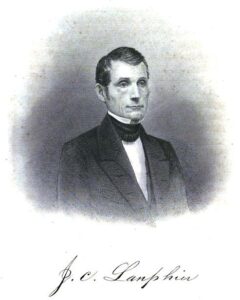
So, following Fuller’s example, what should pastors do today, this week, as we prepare to see God’s will revealed next week? First, we can beseech God for mercy. One thing I find missing from much of the Christian discourse on the political situation in which we find ourselves is any real call for the church to pray. If God is sovereign and in control, shouldn’t we beg Him to do what only He can do? Who knows if God will be gracious? Would to God we see the kind of movement toward prayer that was witnessed in the Fulton Street Prayer Meeting of 1857. Is it too late to ask God to be merciful? Second, we can recognize that God is alive and well and will do what will ultimately bring him glory. The world will not end next Tuesday no matter who is elected. For my part, the end of the world is at least 1007 years away! But it certainly will not end next week. Third, pray for the best but prepare for the worst. Things may get worse before they get better. Our Chinese brothers and sisters haven’t had the kind of freedom we current enjoy ever. Our turn for oppression may come. Are we preparing our people for that day? In a little over a week, we will have a president. Will it be a new one? God only knows. It will be the president that God from eternity past has chosen for America at this time. By all means vote and encourage others to do so. God uses means to accomplish his will. But know that if the election does not turn out the way you wish, then align your will to God’s and trust Him for the future. He is still sovereign. This is my Father’s world!
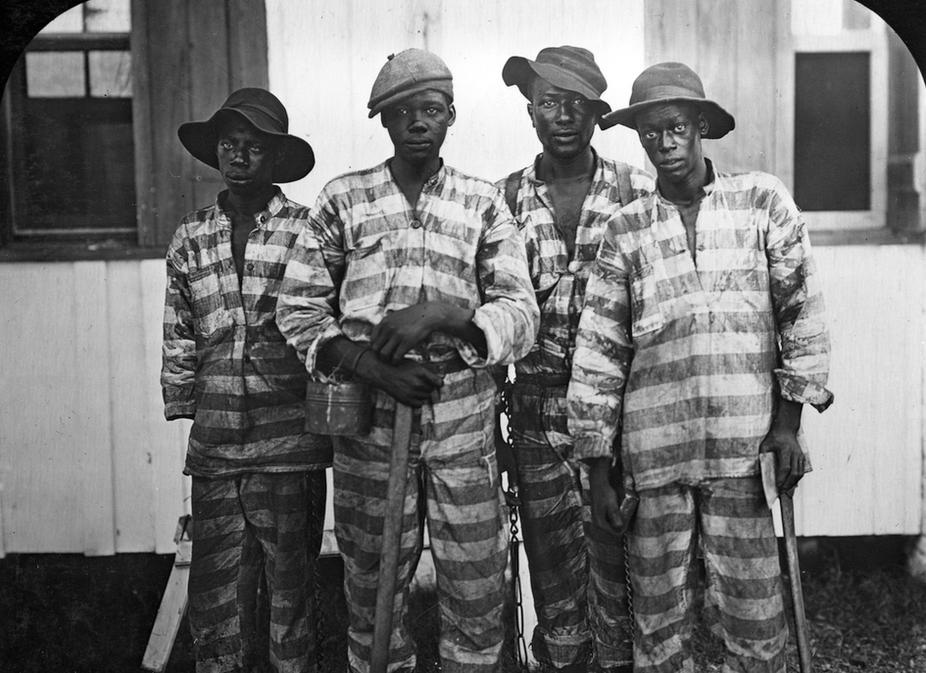
Baptists and Slavery in the Public Discourse
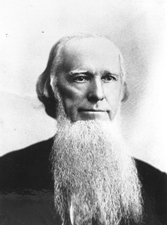
On Monday last, R. Albert Mohler of the Southern Baptist Theological Seminary of Louisville, KY, where I did my doctoral work, announced that the seminary would vacate the Joseph Emerson Brown Chair of Christian Theology Mohler has held since 2005 because Brown, Confederate governor of Georgia during the Civil War, after the war, made use of the “convict-leasing system” to operate his Dade County coal mines in North Georgia, gaining Brown considerable wealth. The “convict-leasing system” (slavery by another name) used out of work individuals, mainly blacks, incarcerated for the crime of joblessness. These “convicts” were “rented” to local businessmen who treated and brutalized them like slaves. If there was a “hell on earth,” it was in Brown’s mines. Brown, a Southern Baptist layman, gave $50,000 at a particularly desperate time in the history of the seminary to help it continue to operate. Brown “saved the seminary” with his financial gift. The seminary named its chair of theology in his “honor.”
In recent times, some have called for the seminary to remove the names of the slaveholders which are attached to the various buildings, halls, etc. at the seminary. The seminary founding fathers, James P. Boyce, Basil Manly Jr., William Williams, and John A. Broadus owned 51 slaves between them. While the seminary board rightly decided to remove Brown’s name from its prominence at the seminary (Mohler going forward will hold the Centennial Chair of Christian Theology), the Board chose to retain the names of the founders that may be found around the campus—the James P Boyce Library, Broadus Chapel, etc. In addition, five million dollars has been allocated to provide scholarships for African American students, to be doled out in increments until the five million has been exhausted. For Mohler’s report, see here. For other articles on this story, see the report in World, the progressive Baptist news outlet Baptist News Global and Louisville’s local paper, The Courier-Journal. Mohler, in justifying the Board’s decision, argued that the Bible honors men that had feet of clay. David, the sweet Psalmist of Israel and a man after God’s own heart, was an adulterer and a murderer. For his part, African American Southern Baptist pastor Dwight McKissic thinks that Mohler’s position of removing the prominence of one man’s name and not another is an inconsistency that another generation of Baptists will have to deal with.
I am neither going to weigh in as to what the seminary should do vs. what it has already done. Nor am I going to criticize Mohler and the Board for its failures. This is a complex issue that won’t easily be solved. I, for one am glad to see the J. E. Brown chair of Christian Theology vacant. Brown, as a layman, did some ugly, sinful things while professing his love for God. His current reality is up to a righteous and holy God. But his legacy needs to be repudiated. If I take this position, doesn’t this suggest I should favor the removal of the names of the founders for the same reasons? Perhaps. But perhaps not. Why?
As a matter of providence, I have not posted in recent days because I have been working intently on a paper “Baptist Emancipationists and Abolitionists – The American Story” to be read at the annual meeting of the Evangelical Theological Society next month. The meeting was to be held in Providence, Rhode Island but was switched to a digital meeting due to the COVID pandemic. The paper was to be uploaded to a special website for the meetings by October 15th. I am pretty pleased with the paper’s outcome and look forward to feedback from other scholars. The plan is that this will become a part of a monograph that I am working on entitled at this point Baptists and Slavery. This whole question that Southern is seeking to address has been a matter of intense investigation for me over the past few years—How should Baptists reckon with the past and how should we go forward?
I recently read a book published this summer, White Too Long, where the author, Robert Jones, charges white Protestantism with creating white supremacy. (Coincidently, if you read the article about Southern in the LouisvilleCourier-Journal linked above, you will find reference to this book.) In setting forth his case, he uses Basil Manly Sr., prominent Alabama Baptist leader and author of the Alabama Resolutions (a test case for slavery that resulted in a fractured Baptist missions movement in 1845), and asserts Manly “was widely recognized as the leading theological apologist for slavery in his day.” Well to be sure, Manly was a strong defender of slavery, but the “leading theological apologist”? Superlatives are “always” hard to prove. He referred his readers to A. James Fuller’s fine biography of Manly, Chaplain to the Confederacy as proof. I reached out to Jim Fuller, professor of history at the University of Indianapolis by email. In his lengthy response, he informed me that not only did he not argue for this in the book, he didn’t believe it to be true. He wondered how carefully Jones had read the book to draw this erroneous conclusion. This is the problem in debate. Making a statement is easy, proving it is something else.
Well, whether Manly was or wasn’t “the leading apologist”—the reader should peruse Robert L. Dabney’s Defence of Virginia (1867) for an actual leading apologist of slavery—the Baptists had many defenders—P. H. Mell of GA, Thornton Stringfellow of VA, Richard Fuller of Maryland, Richard Furman and Iveson Lewis Brookes of SC, etc.—but among the Baptists there were some prominent emancipationists who believed that chattel slavery was immoral, contrary to the public good (it produced sloth and avarice among those who kept slaves and demanded brutality to maintain slavery), and it was unbiblical. In 1808, former Virginia Baptist, then resident of Kentucky, David Barrow wrote the first Baptist defense of emancipation. He used the Scripture to refute the biblical arguments put forth by the pro-slavery men to support slavery. One “argument” I especially like–“Our high-toned Calvinist or rather fatalist, says God decreed that slavery should exist; to which you ought to add, God is the author of sin.”
I don’t have time here to discuss the problem of evil, the only real theological problem worth talking about. No, I don’t think the number of toes on the Beast is really worth arguing about. But the problem of evil? Now here’s a debate worth having. Back to slavery—Barrow’s point was that the Bible rightly used would not support the kind of slavery which was built off “man-stealing.” There were so many problems with slavery that I have a hard time wondering how good men like Boyce, Broadus, et al. failed to see its evil nature. But they know better now.
Regarding the question of what to do with our heroes who on closer examination, are not so heroic, I have high regard for the founders of Southern Seminary. Before I knew their full story, these were the men of Christian legend, worthy to be added to Hebrews 11 . . . men of whom the world was not worthy. But to a man, they had feet of clay. Yes, they owned slaves. Sadly, in this they were wrong. What should we do with their legacy? What should we do with the legacy of any sinner? The best of men are only men at the best. Abraham was a deceiver, David a murder, Peter denied his Lord, not once but multiple times and with an oath. The Great Awakening evangelist George Whitefield owned slaves and used them to provide for his orphans. Boyce, Broadus, Manly, Williams and a host of other Baptists owned slaves. These are the facts of history. God help me to be better! But I too have feet of clay. What sin in my life am I missing?

Seeking Forgiveness from Others . . . Am I Willing?
What should I write on this week? Well there is “the debate” from last night that was a train wreck . . . Don’t get me started. There is the sad news out of Christianity Today yesterday about a global Christian leader who may have led a double life. So sad! There is the ongoing issue of religious liberty with the arrest of hymn singers in Moscow, Idaho for not obeying mask and social distancing rules. All of these issues are worthy of discussion, well, maybe not worthy.
I decided that today I would write about something more positive and edifying, about something that happened to me last Saturday. I read Lamentations 3 in the morning . . . “Great is your faithfulness” and “wait on the Lord” both of which at this point in my journey were a tremendous encouragement. Sometimes God, who is always faithful needs time to act. Now, when I say God needs time to act, I don’t mean that he cannot accomplish something in short time, so he requires longer time. God does not need time to investigate a situation, or time to prepare to answer a need or time to figure out a workable solution. He uses time with us to teach us to trust in Him. He is not slow nor is he hasty. He does what He does in His own good time and for His own good reasons. When we think that God is unjust or blind or doesn’t care, we need to remind ourselves that He is always faithful. Always! We just need to wait!
So, I read Lamentations in the morning and later that afternoon, I received a phone call from “George” with whom I went to school more than forty years ago. George and I ended up serving the Lord “together,” not “together together” but close to one another, in the same part of the Lord’s vineyard. We periodically had contact down through the years and maintained a good friendship (I thought) as we had similar sensibilities and goals in life. Eventually we separated geographically to the point where we had limited interaction except by telephone, in the days before cell phones with their “free” long distance and the internet. But we remained friends. Our children were friends even through college, our wives were friends, and we had been in each other’s homes on a number of occasions. We spent time praying together for our ministries. We even recreated together on occasion.
About five or six years ago, a breach occurred that seemed to end that relationship. The details are unimportant, and quite frankly, I can remember few of them with any specificity. There are some things that getting old does help! A failing memory is not always a bad thing, especially when it comes to past grievances. In the course of a conversation, my friend said some things that were unpleasant. The conversation ended and from that day until last Saturday, we hadn’t spoken, a period of maybe five or six years.
Out of the blue, my brother called me to ask my forgiveness for the breach that had occurred years ago. It was a simple, straight forward request. He said he had done wrong; he knew it was wrong and he wanted to seek forgiveness. I was glad my friend called. I was glad I could extend to my brother forgiveness that ultimately is found through Christ. In a few minutes the past relationship was restored, and I am happy to say that George is my friend still.
As I have reflected on this event over the weekend, I decided to write on this to challenge ministry men in particular to ask the question, Am I willing to seek the forgiveness of those I have wronged? We all sin, and we all need to ask forgiveness—from our wives, from our children, from our associates, from our church members, from our neighbors, from strangers, from whoever. Forgiveness needs to be sought when we sin.
There are several reasons why my friend’s seeking forgiveness was such a blessing. First, it was pleasing to God. God is always pleased when we do right. My friend honored God by seeking forgiveness. Second, it was good for my friend to do right. He had been convicted by God that he needed to make something right and he did the right thing. His seeking forgiveness made him a better man and a stronger Christian leader. His humility made him better. He could have ignored God’s conviction, but at great peril to his own soul. He gained little from me by doing the right thing, but he gained much from God. Third, it was good for his ministry. When a leader sins, no matter how insignificant (I doubt that many people even knew of our breach), if a man fails to make things right, its hurts his ministry. If things pile up and go unrepented of, God has a way of bringing these past infractions to bear on our lives. Fourth, it was good for his marriage. His wife knew about the breach and she likely knew about the repentance. By my friend doing the right thing, he set a great example before his wife that should encourage her in her walk with Christ. Fifth, it was good for his family, even if they knew nothing about either the breach or the repentance. George is a better man today for what he did, which means he will be better in all of his relationships. Kudos, George, for doing the right thing. Sixth, it was good for me. It restored a relationship that I cherished. George and I are friends again and who knows how God may use us together for His greater glory. It was also good for me as an example of doing the right thing. I must confess that over the weekend I wondered if there are those who I have offended that I need to do this with, even years later. I do not want to enter eternity with unresolved personal offenses with people. I welcome opportunities of restoring relationships with people—those whom I may have offended as well as those who may have offended me. Finally, it provided me something to write upon this week that I hope will encourage others.
This brings me to a final question—Am I willing to grant forgiveness to those who have sinned against me? What would have happened if I had failed to forgive my friend? He would have strengthened his relationship with God but mine would have been greatly injured. Sometimes, it is hard to grant forgiveness for the wounds of others. If you think we have it hard to do this, consider how difficult it must be for God to forgive us whose sins made Jesus’s death on the cross necessary for our salvation.
Forgiveness is a beautiful thing. Ultimately, forgiveness starts with God and flows through the Cross. As we have received it, we must extend it to others and seek it for ourselves when necessary. God grant us the grace to do the right thing, no matter how hard. Eph. 4:32 “Be kind to one another, tenderhearted, forgiving one another, as God in Christ forgave you” (ESV).
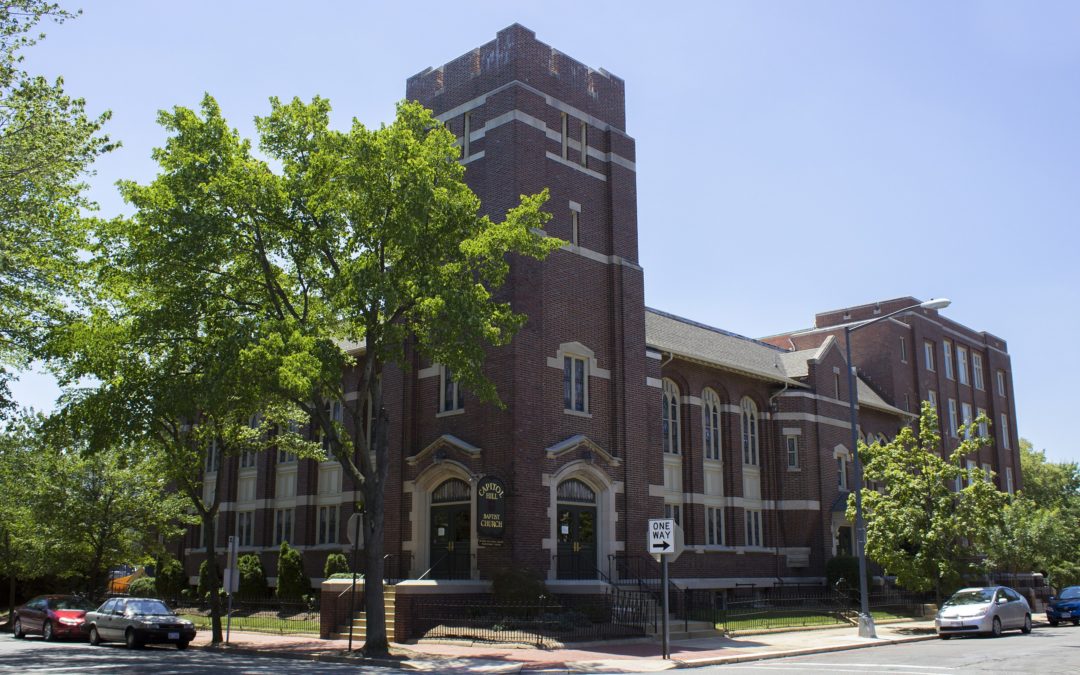
Capitol Hill Baptist Church of Washington D. C. Joins the Constitutional Challenge
Yesterday, after months of closure due to COVID, one of the nation’s most prominent conservative Southern Baptist Churches, Capitol Hill Baptist of Washington, D. C., had its lawyers file a suit against the city and its mayor arguing that the church’s constitutional rights continue to be violated under the city’s COVID Phase 2 rules which expressly allow meetings of up to 50% of a buildings stated occupancy or 100 whichever is less. Capitol Hill typically had about one thousand in attendance before COVID. It has had no virtual services during the pandemic, with Pastor Mark Dever arguing that “a video of a sermon is not a substitute for a covenanted congregation assembling together and all the various means of God’s grace in that. I think it would be healthier to respect God’s strange providence in a period of abstinence from meeting together.” Capitol Hill has held some outdoor meetings but is looking for a larger venue to increase worshipper capacity where social distancing could be done but has run into legal obstacles.
Moreover, the lawyers for the plaintiff argued that the mayor and her officials have repeatedly ignored Phase 2 prohibitions with respect to mass gatherings, also protected by the First Amendment, while at the same time insisting on the compliance of houses of worship. She has either participated in these protests herself or permitted the protests to go forward unrestricted without strict adherence to the COVID restrictions. The suit also pointed out that neighboring states have fewer restrictions on churches, despite having a greater COVID impact.
Both Capitol Hill Baptist Church of D. C. and Grace Community Church of Los Angeles recognize the biblical mandate to meet for corporate worship. They may not be on the same page on how to do this and still honor God. Capitol Hill went on record opposing the civil disobedience position of Grace Community Church (also here) who continues to meet despite the threats of the civic officials and fines that may accrue. By filing this action, Capitol Hill effectively joins Grace Community Church in arguing for the believer’s right under the Constitution to meet. The vote of the church with a membership of about 850 to affirm the decision to file this legal action was apparently 402 to 35. Of course, it is too early to know just how far the church is prepared to carry its suit in the courts or what Capitol Hill will do if their litigation fails. Will they at some point feel the need to practice civil disobedience? It is hoped that the threat of COVID will soon come to an end although this does not seem to be on the horizon. With the American death count over 200,000 related to COVID, many Americans remain fearful of relaxing prohibitions, even if it means that churches are restricted or kept closed. These indeed are sad days when churches have to sue their government to receive the protection afforded them under the Constitution. We need to pray for God to intervene and we need to pray for our church leadership to have wisdom as they seek His will during these trying times.
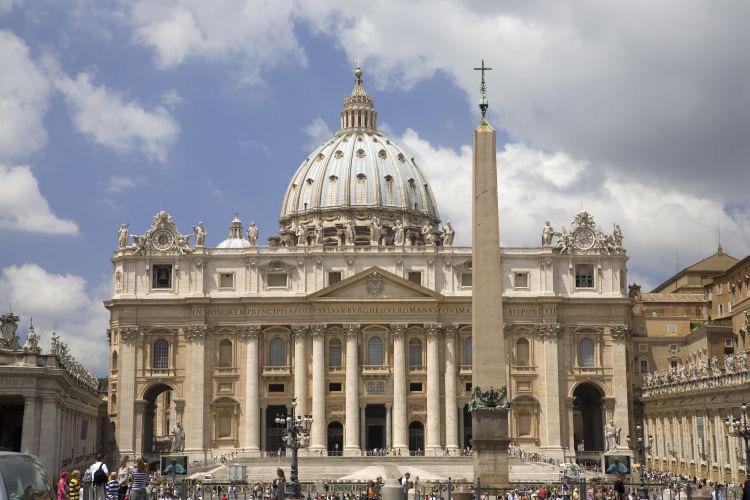
Into the Church of Rome? An Evangelical Goes Home?
Social media and the religious press are talking much about the recent conversion of former Christianity Today editor Mark Galli, at one time a Presbyterian minister, who became an Anglican, flirted with Orthodoxy, and has now been received into the communion of the Church of Rome this past Sunday. He recently made a name for himself calling for Donald Trump’s impeachment, one of the few evangelicals to publicly do so. Galli is hardly the first or even the most prominent former evangelical to “return to Rome,” but he is the latest in a long line of evangelicals that are ensnared by the “smells and bells” of the Church seemingly overlooking its significant heterodoxy. He wanted to take his Anglicanism “deeper and thicker.”
In 1991, my family and I relocated to Windsor, Ontario from northern Alberta in the late summer to better care for our one-year old premie son. We were told that moving out of the North would come, so we decided for Joshua’s sake, that sooner was better than later. We considered our options and chose Windsor as our new home, believing that the services we would need to help our infant son would be readily available.
Soon after arriving in town, I had occasion to meet the pastor of a good Baptist church in the city who he asked me what we would be doing for church. Being there for less than a week, this was not a question I was prepared to answer. Dave informed me that the Sunday previous, another Baptist church in the city had its pastor resign. It seems that this other man decided he would be more at home in Anglicanism. In the providence of God, we were living fairly close to this church, so I decided to drop in for the mid-week service. On arrival at the church, a small assembly of perhaps 80–90, I met Paul, a man about my age, who was wrapping up his ministry, intent on a significant life change. I also met church members who, when learning about my own journey as a Baptist pastor, began to consider whether the Lord had brought their next pastor to them without their searching, even before their former pastor left.
I would like to rehearse just how the Lord brought us together, pastor and church, but I will leave this for another day. Suffice it to say, that by November, I was the church’s next pastor. Soon I was hearing about the ministry of my predecessor, a man who had been at the church but two years. It seems that he actively studied for the Anglican ministry in Windsor while pastoring a Baptist church. When asked by a church member why he didn’t resign once he perceived his theological direction, he apparently stated that he had to feed his family. The church was vexed that their Baptist pastor would soon become an Anglican. One older saint told me that she once stood up in a service and waved her cane at the man, complaining that he was trying to make the church Anglican (or Catholic, I just forget which).
As I got to know the lay of the land at Emmanuel, I learned that Arnold Dallimore, the Canadian biographer of George Whitefield, had been a former pastor (an interim between the church’s founding pastor and the church’s second regular pastor). Arnold had pastored for a number of years in Cottam, Ontario, just a few miles up the road from Windsor, and my predecessor, the new Anglican, had been a member of his church, Cottam Baptist Church, as a young man. Dallimore and I periodically discussed the man’s transition. In fact, Dallimore, I believe, recommended the man go to Toronto Baptist Seminary. My predecessor graduated in April 1982, at the top of his class, delivering the valedictory address opposite the commencement speaker, Don Carson. After TBS, my predecessor worked in Baptist churches in Ontario, including in Toronto and later in Sudbury with John R. Boyd, a T. T. Shields stalwart. He eventually came to Windsor at the end of the 1980s, taking up the small pastorate of Emmanuel.
His Windsor ministry was unremarkable, likely due to his theological pilgrimage then under way. The church not only practiced open communion, it also practiced open membership. As I was filling the pulpit in the weeks before I was actually called to the church, the treasurer called me one day and asked me if I would baptize him. Odd to have a member of a Baptist church not baptized! Apparently my predecessor told the man, who had been baptized in Methodism (not by immersion), that the mode of his baptism was inconsequential. Though he felt otherwise, my predecessor would not baptize him. After my predecessor left the church, the treasurer followed the Lord in believer’s baptism!
I told this story because I have seen the havoc done in a small way when a man goes from evangelicalism into the church of Rome. Thankfully Emmanuel had Tilly and others (e.g. Arnold Dallimore’s son Paul) who saw the errors of their pastor’s direction and did not follow him, either into Anglicanism and or into Rome. As recently as last year, my predecessor, who not long after becoming an Anglican was received into the Church of Rome, was still saying Mass in Catholic churches in Ontario, thirty years later.
Having studied church history formally for the past twenty years, including visiting many of the major Gothic cathedrals of Europe, I am perplexed to understand how someone with true evangelical (gospel-centered) faith can become a Roman Catholic. To be sure, if you know what you are looking for, the Gospel can be found in the carvings and images of many Catholic churches. But the message is confused and clouded by a host of other things mixed in. It’s a little like looking into a garbage can outside a fine restaurant’s kitchen. You can see the leftovers of good food, but it’s mixed in with the waste of the kitchen so that if you tried to eat what you saw, you would become very ill.
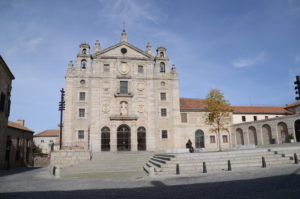
Iglesia-convento de Santa Teresa, Avila, Spain
A few years back, while visiting Avila, Spain, I saw one of Teresa’s fingers on display. At other churches across Europe, there are bone fragments allegedly from one of the disciples, pieces of wood allegedly from the cross, and of course there is the famous Shroud of Turin which supposedly was the burial clothe of Jesus, complete with his image forever imprinted into it. In Montreal, Quebec at St. Joseph’s Oratory, there is the heart of Brother André Bessette who was a lay Catholic leader to whom people came for healing. He became Blessed Brother André in 2010 when Benedict XVI recognized a second miracle allegedly coming after the intercession of André. On a visit to Fatima, Portugal, one can see shrines to the three shepherd children who allegedly saw an apparition of the Blessed Virgin in 1917. And the list goes on. These relics and holy sites offer blessings and miracles in abundance to the faithful who seek them. Similar extra biblical accoutrements can be found around the world in Roman Catholic churches large and small.
This doesn’t even begin to address the official theology of the Church of Rome. In the mid 1990s, a group of evangelicals and Catholics started a confab highlighting the similarities of the two movements (supposedly we are more alike than different) and downplaying the differences. I attended one of these meetings in Minneapolis in my early years at Central. I listened as men around the table talked much of their mutual agreement on justification by faith. Well, Rome has never denied justification by faith. What she denies is sola fides—justification by faith alone. That final word utterly separates biblical Christianity from everything else, including Roman Catholicism. For Luther, Calvin and Zwingli, salvation came only by faith plus nothing, minus nothing. Rome in its response to the theology of the reformers anathematized sola fides (Trent, Sixth Session). Whole books, starting with the Reformer’s writings themselves (and before) unpack the real and significant differences between Roman Catholicism and evangelicalism. If anything, those differences are more significant today.
I don’t know Mark Galli nor am I qualified to judge his heart—this is the work of the Holy Spirit. But I can evaluate his actions. To embrace Rome is to embrace error—unmitigated, unvarnished, and unrepentant error. I for one am sad to see a former professing believer go into the Church of Rome. It’s a bit like dumpster diving in the back of a great steak house: you might find something edible, but more likely you will find much that will kill you. God be merciful and keep us from falling (Jude 24).
Singing in Worship . . . Should We or Shouldn’t We? What’s a Stake?
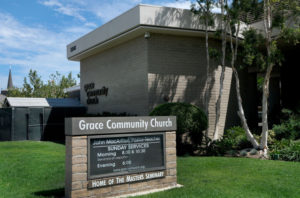
(Photo by Dean Musgrove, Los Angeles Daily News/SCNG)
Los Angeles continues to try to force Grace Community Church to cease and desist its corporate worship. Among the latest efforts to pressure the church is the cancellation of a parking lot lease that Grace has had in place with the county since 1975! As of October 1, the church is liable to have property removed from the site and will have to pay expenses incurred for such removal. On Friday, another judge heard the case and his opinion is pending in the coming days. These are but the latest struggles with the COVID restrictions and the question of whether churches are subject to the law or if a church has a duty to obey God first. Part of the question to be considered—Can we sing even if it means defying civil laws? After my first post on GCC, I was reminded by a Canadian friend that things are a bit different with our brothers north of the border. They technically do not have a Constitutional right for freedom of worship, although they have something similar in The Charter of Rights and Freedoms. I lived in the “true north strong and free” for nearly nineteen years and my entire family are both Canadians AND Americans (some by birth and some by naturalization), but the specifics of Canadian religious liberty never rose to the importance of deep reflection for me during those years. So, I asked my friend what he thought the differences were north and south. He suggested that a big difference between the countries is that Americans consider that certain rights are “inalienable,” (unalienable in the original documents)—that is rights by birth. The Declaration of Independence (1776) affirmed that people are “endowed by their Creator with certain unalienable rights,” e. g. “life, liberty, and the pursuit of happiness.” Of course, African slaves brought to the Americas were excluded from this “guarantee,” but this a discussion for another time. We have unalienable rights, while Canadians have rights granted by The Charter. What can be given, can be taken away. Americans (technically Canadians are Americans too!) think that as God grants certain rights, only He can take them away, not the government, while Canadians believe that the sovereign can grant or withdraw privileges (aka rights) at will. Americans have God-given rights while Canadians rights given by the Crown. This brings up an important historical consideration. Does the monarch, president, governor, or other civil official have the right before God to regulate Christian worship forgetting any constitutional or charter issues? In other words, is religious practice within the purview of the sovereign? Are Canadians or Brits any more obligated to obey their governments when it comes to worship than Americans who have the freedom to do otherwise? Ultimately, this is a question of religious liberty, a position long held dear by Baptists. I am not attempting to answer a Canadian question per se, but to discuss a larger issue. The debate over the Christian and his duty to obey civil leaders is a long and complex question. Our friends at Cripplegate put out a thoughtful blog considering the spectrum of Christian beliefs on civil obedience/disobedience from Romans 13. The view that I resonate with is, of course, the Baptist view—Obey when the Government promotes good or checks evil and recognize that the government should not regulate the affairs of the church. While this is called “the Baptist view” in the blog, this is really the “Religious Liberty” view. It stems not from the Baptist church as such but from the Bible—the Bible nowhere grants to civil leaders the power over the conscience. Believers from Daniel to the apostles disobeyed laws that restricted worship and hindered proclamation. The history of Baptists and religious liberty which is necessarily connected to the separation of the church and the state reaches back to the earliest days of our movement. Baptists emerged out of the Reformation, specifically English Puritanism/Separatism. Some Puritans argued for a separation from the state church—Anglicanism which replaced Roman Catholicism’s pope with the British sovereign, first Henry VIII, then Elizabeth I. Both monarchs enacted laws to compel Anglican worship. They wanted the English church separated from its Roman overlords, initially so Henry could divorce and remarry. The ostensible goal of an English church was civil stability. The king couldn’t have subjects with divided loyalties. The pope tried to force the king to heel by telling his subjects that they could disobey the laws of a rebellious king. Subjects who refused the pope would be placed under the interdict—cut off from the church. Cyprian’s dictum was extra ecclesium, nulla salus (outside the church, no salvation). If you were kicked out of the church, you were barred from heaven. On the king’s part, for his subjects to be good and loyal Anglican church members meant they were good and loyal English subjects. The Puritans hated the incomplete reformation in the English church. They hated the rules imposed on them by the sovereign. Many pastors were ejected from their pulpits for refusing to comply with forced Anglicanism, e.g. the requirement to use the Book of Common Prayer in worship. However, it took the Separatists to make the break with the Anglican Church and form non-conforming churches. These believers took things on the chin—they were hunted, imprisoned, impoverished and some executed. A group of these rebels, living in Amsterdam, came to understand that baptism (not immersion but affusion) was only for believers. John Smyth, in 1609, decided to right the wrong of infant baptism by baptizing himself (se-baptism). He soon came to think that this novel baptism was defective, so he sought another baptism from the Waterlander Mennonites nearby. His followers, whom he had subsequently baptized after his se-baptism, refused to repudiate their irregular baptism (Smyth had irregular baptism, so did they according to his thinking) and split (in good Baptist fashion) from Smyth, returning to England, to Spitafield near London, and formed the first Baptist church on English soil (1611). Thomas Helwys, the leader, penned a treatise, A Short Declaration of the Mistery of Iniquity (1612), a copy of which he sent to the sovereign, King James. On the front free end page of the king’s copy, now preserved in the British Library, Helwys wrote, “The king is a mortall man, not God therefore hath no power over ye immortall soules of his subjects, to make lawes and ordinances for them, and to set spiritual Lords over them.” For his efforts, Helwys was arrested and imprisoned at Newgate, dying there around 1616. Admittedly, the circumstances of Helwys’s resistance to the king and GCC’s resistance are different, or are they? Both argued for religious liberty on a biblical basis. While the US Constitution also addresses this, isn’t the Bible sufficient to decide these matters? Just how much authority (or tyranny) are Christians required to endure? Consider the California church that has racked up enormous fines for refusing to shut its doors. In China today, president-for-life Xi Jinping’s program of sinicization is removing crosses and portraits of Jesus in churches and replacing them with portraits of the president. At the same time, efforts are underway to replace the Chinese Bible with a better, more China-friendly version. Chinese Christians cannot organize churches and appoint their own pastors, a least not openly. The house church movement has flourished in China because, despite a basic lack of freedom for religion in China, they continue to meet and follow biblical teaching in defiance of civil authority. Should Chinese Christians submit to their government? Why is their situation different than ours? I respect my Canadian friends who think they must obey the law at all costs, even if this means no singing in the assembled services, unless the service is held outside. But I am not persuaded that GCC is sinning by doing the opposite. I warned my Canadian friend that this “pandemic” could be a “camel’s nose in the tent.” Just how much regulation will we tolerate from our governments? Henry VIII and his successors argued that a state church meant civil stability. The dissenting churches were destabilizing things by disobeying the “law.” Is GCC doing any different? I haven’t answered the question about singing. I have argued a larger governing issue—religious liberty. The answer to the singing question seems simple. Is singing a necessary part of worship? If you think it is, how then can you rightly worship as a church without it? What if this violates the law? As a Baptist, I would answer that the king needs to keep out of the church, the pandemic notwithstanding. I am not arguing that Christians should be cavalier. But neither can Christians simply disregard biblical duties. If singing is a part of worship and worship is to be regular, then so must singing. O Lord, grant us wisdom to understand, grace to persevere and love for others in these difficult days.